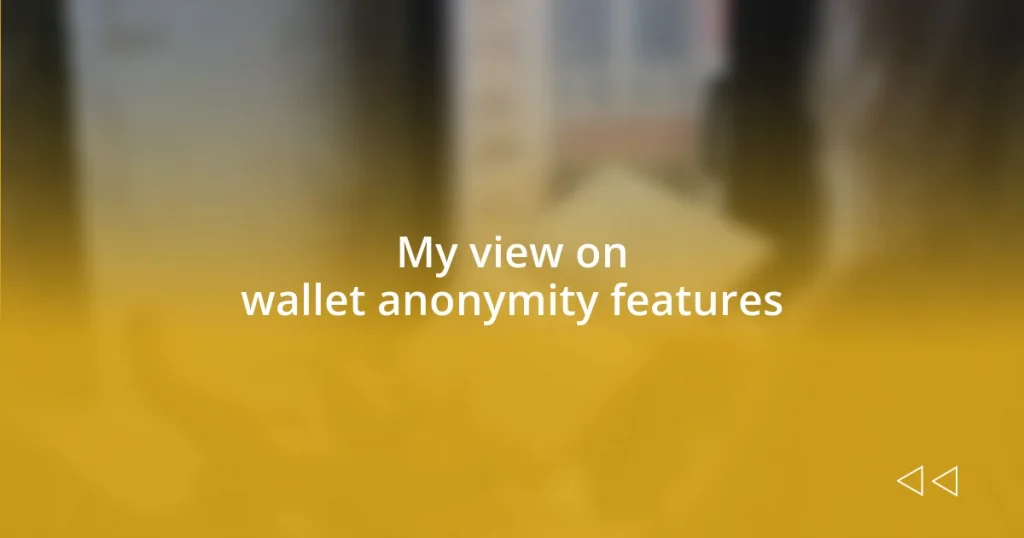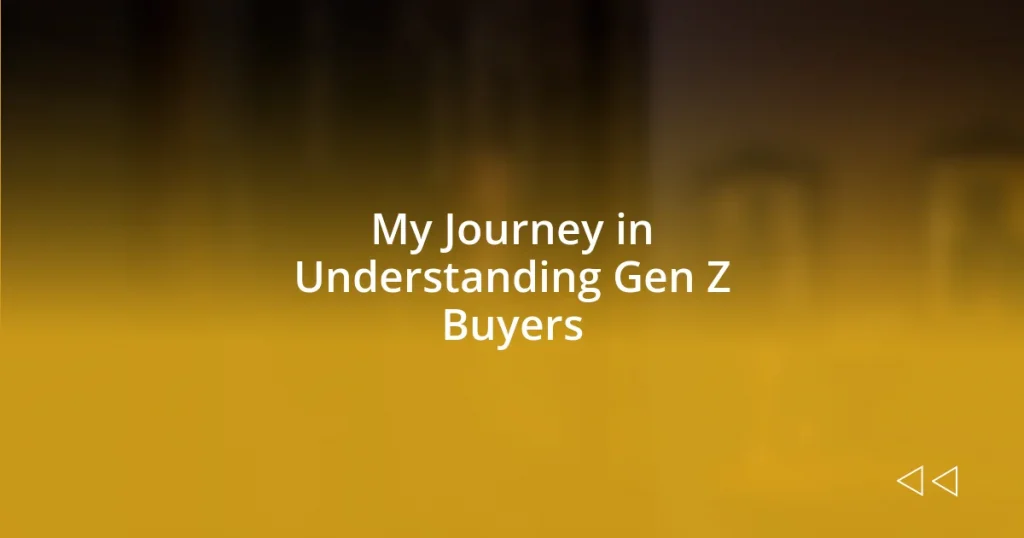Key takeaways:
- Wallet anonymity features, such as mixing services and privacy coins, are crucial for protecting users’ identities and maintaining financial autonomy.
- Privacy in digital transactions fosters trust and encourages innovation, allowing users to engage freely without fear of exposure.
- Legal regulations surrounding wallet anonymity vary by jurisdiction, posing potential risks for users who prioritize financial privacy.
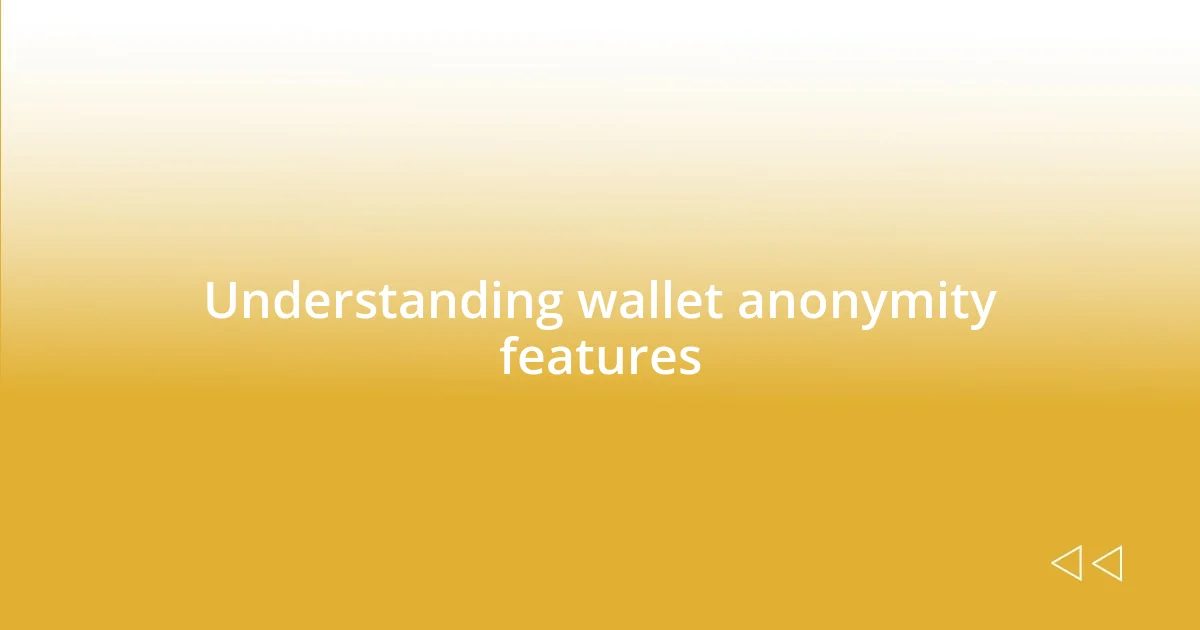
Understanding wallet anonymity features
Wallet anonymity features are designed to protect users’ identities, offering a layer of privacy that’s increasingly essential in today’s digital landscape. When I first delved into cryptocurrency, I was overwhelmed by the thought of sharing my financial data openly. It made me wonder: how safe is my information really? This curiosity drove me to explore various wallets that promote anonymity, ultimately leading me to appreciate their critical role in safeguarding personal information.
One feature that stands out is the use of mixing services. These tools blend various transactions, making it nearly impossible to trace funds back to their origin. I remember using a mixing service for the first time; it felt like stepping into a cloak of invisibility. The thrill of anonymity captivated me. It made me reflect on a universal truth: we all want control over our financial identities, don’t we?
Another vital aspect is the use of privacy coins, like Monero or Zcash, which incorporate advanced cryptographic techniques that enhance anonymity. I found myself fascinated by how these coins shield user data on the blockchain. It felt empowering to know that my transactions could remain private, much like how one might want to keep their personal conversations discreet. After all, isn’t the ability to protect one’s financial autonomy a fundamental right?
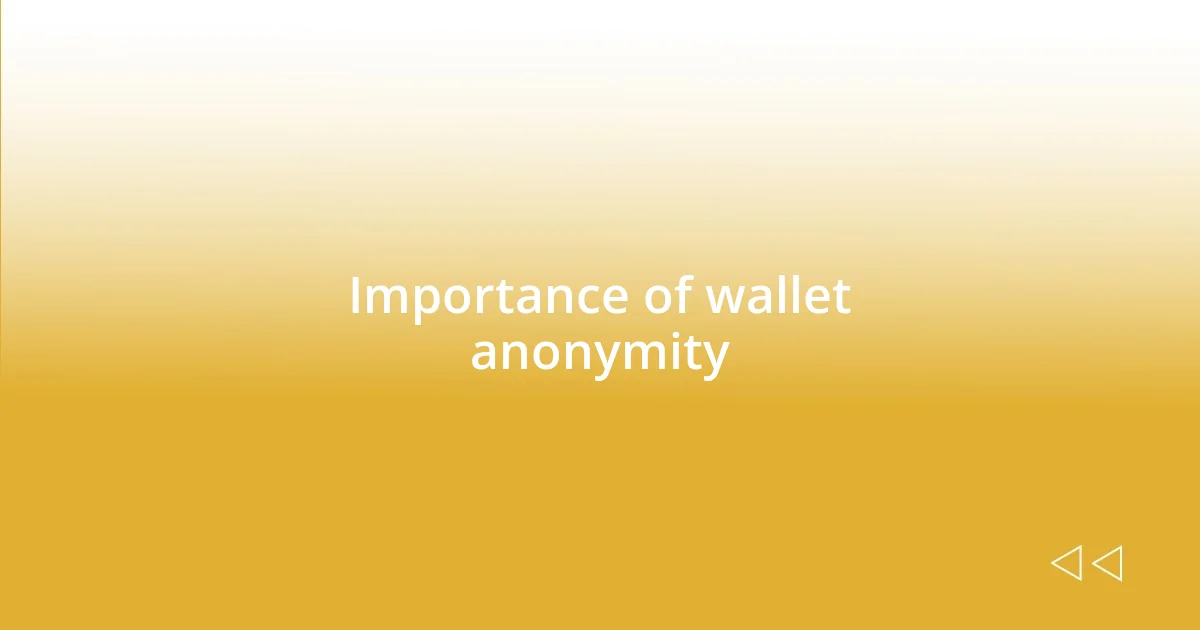
Importance of wallet anonymity
Wallet anonymity is essential because it empowers individuals to control their financial narrative. I often think back to when I first ventured into the world of digital transactions. Each time I clicked ‘send,’ a wave of anxiety washed over me—who else could see my financial activity? This concern motivated me to prioritize anonymity features in my wallets, turning my initial apprehension into a liberating sense of security.
The significance of anonymity goes beyond mere privacy; it forms the backbone of trust in the digital economy. I had a friend who experienced identity theft, and it left lasting scars on her financial life. Understanding how wallet anonymity can act as a protective shield inspired me to advocate for its importance; without this layer of security, users are left vulnerable to unwanted scrutiny. Isn’t it essential to consider how much we value our privacy in this digital age?
Moreover, maintaining anonymity fosters innovation and honest transactions in the digital space. I recall stumbling across an online marketplace where sellers insisted on using anonymous wallets, creating an environment of trust among users. It reminded me that when people feel safe, they are more willing to engage freely. Isn’t that a fundamental aspect of any community—feeling secure enough to participate openly?
| Aspect | Importance |
|---|---|
| Control over Financial Narrative | Empowers users to manage their identity and transaction visibility. |
| Protection from Fraud | Reduces the risk of identity theft and unwanted attention. |
| Encouragement of Open Markets | Fosters trust among users for innovation and secure transactions. |
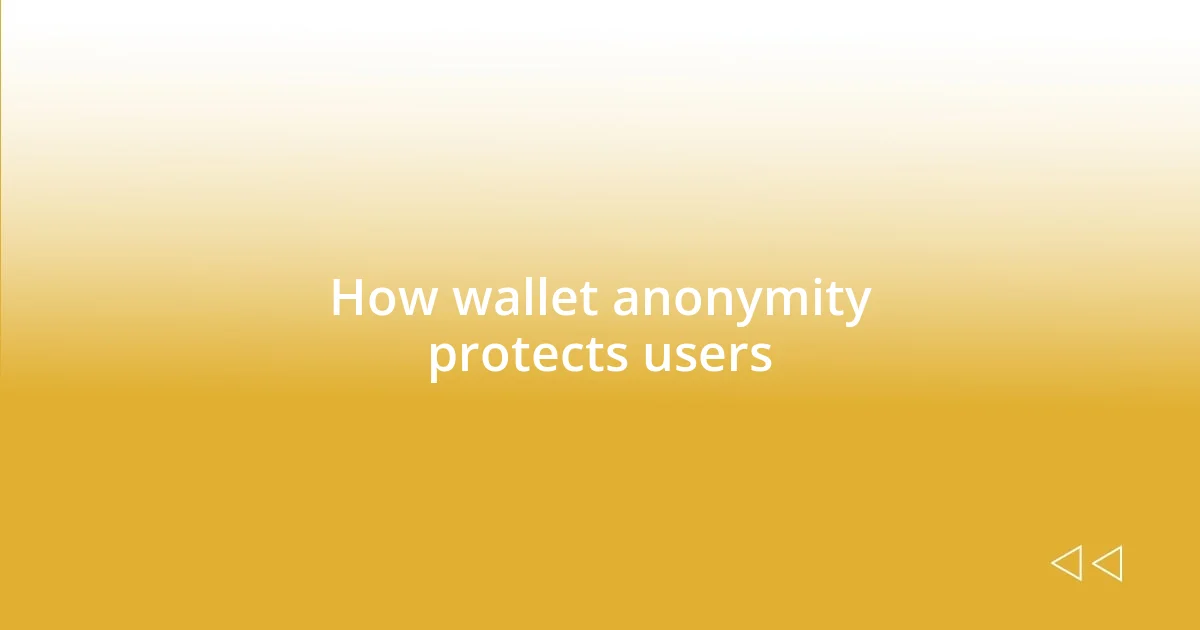
How wallet anonymity protects users
When I think about how wallet anonymity protects users, I can’t help but reflect on my own experiences navigating the world of online transactions. One day, I received a notification about a suspicious login attempt on my wallet. That moment was terrifying; it made me realize how crucial it is to mask my digital footprint. Anonymity allows me to manage my transactions without looking over my shoulder, knowing there’s a protective barrier around my sensitive information.
Wallet anonymity features create an essential protective shield for users, enabling them to operate freely without fear of exposure. Here’s how this anonymity enhances security:
- Minimized Traceability: Anonymity prevents tracking of transactions, reducing the risk of targeted attacks.
- Enhanced Confidence: Knowing that my personal data is obscured lets me engage more openly with various platforms.
- Protection Against Targeted Scams: An anonymous wallet helps shield against phishing attempts that exploit visible user data.
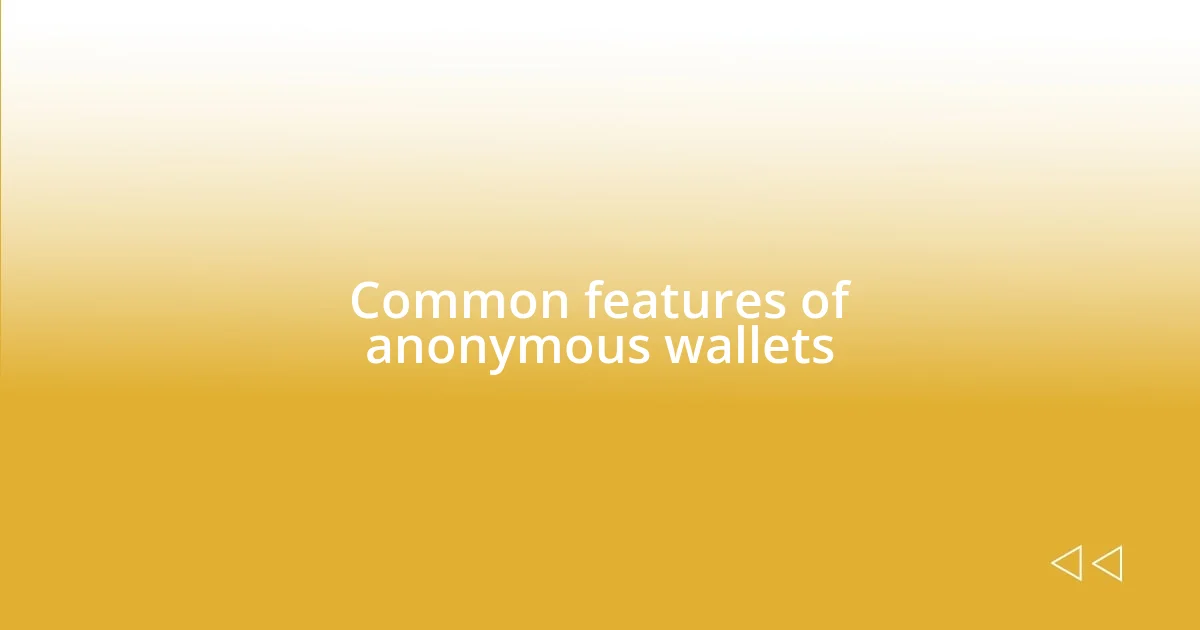
Common features of anonymous wallets
Anonymous wallets typically incorporate a variety of features designed to protect users’ identities. For instance, many of these wallets utilize advanced encryption techniques. I remember my initial hesitation when encrypting my transaction data, but the peace of mind it provided was worth it. Imagine being able to spend without constantly worrying about someone peering over your digital shoulder!
Another common feature is the use of mixing services, which essentially obfuscate transaction histories. When I first learned about this, I was fascinated by how it could create layers of anonymity. It’s like tossing a pebble into a pond, where the ripples make it nearly impossible to trace the original source. Isn’t it fascinating how technology can create such unexpected barriers against unwanted scrutiny?
Furthermore, some wallets allow for the use of decentralized systems, which enhance user privacy. I can still recall the excitement of making a transaction on a decentralized platform where my identity was completely shielded. It got me thinking: how liberating is it to interact in a space where my personal data isn’t just a click away for anyone to exploit? It’s a game-changer in how I view online financial interactions.
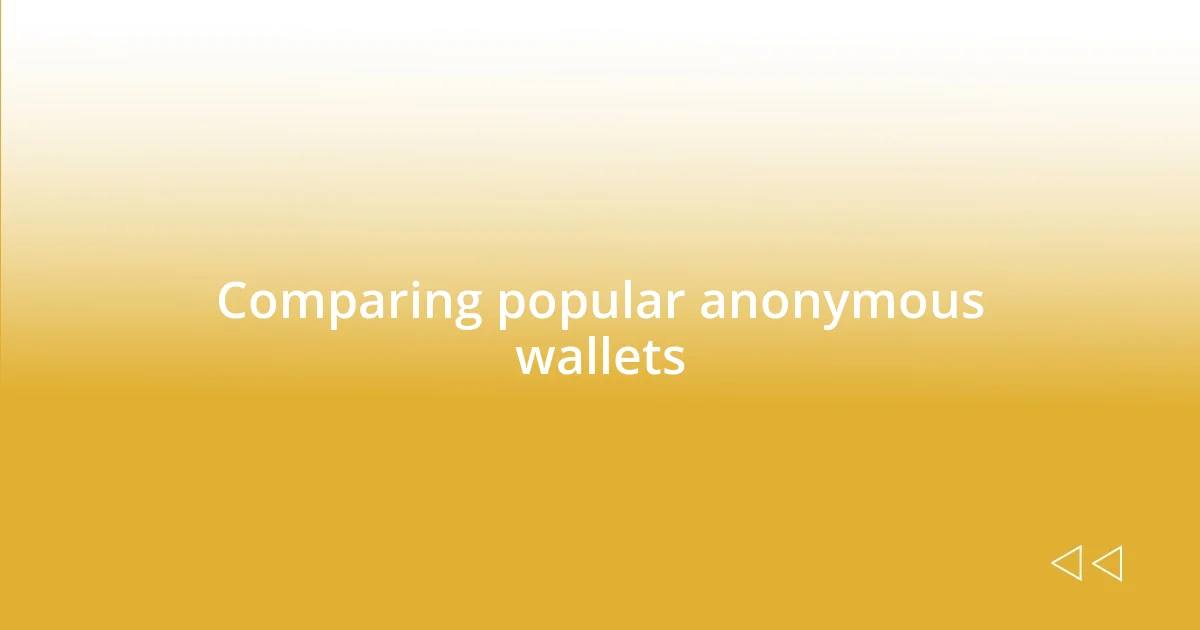
Comparing popular anonymous wallets
When comparing popular anonymous wallets, it’s essential to examine their features and how they address user needs. For instance, I once explored the world of Monero, which focuses heavily on privacy through its unique technology called ring signatures. It was eye-opening to see how that feature effectively obscures transaction origins. Do you ever wonder how many other wallets could offer such a level of security while maintaining user-friendliness?
Another option that caught my attention is Zcash, known for its zero-knowledge proofs. The idea that I can prove I have enough funds without revealing my identity was revolutionary for me. It made me ponder: in a world where sharing is so common, how refreshing is it to have an option that prioritizes complete privacy?
Lastly, I can’t overlook Dash, which incorporates a feature called InstantSend that allows for quick, anonymous transactions. I remember using it during a time-sensitive purchase where I desperately needed to maintain my anonymity. The thrill of making that transaction without anyone being able to trace it gave me a sense of empowerment. It’s remarkable how these wallets not only facilitate transactions but also enhance our digital sovereignty.
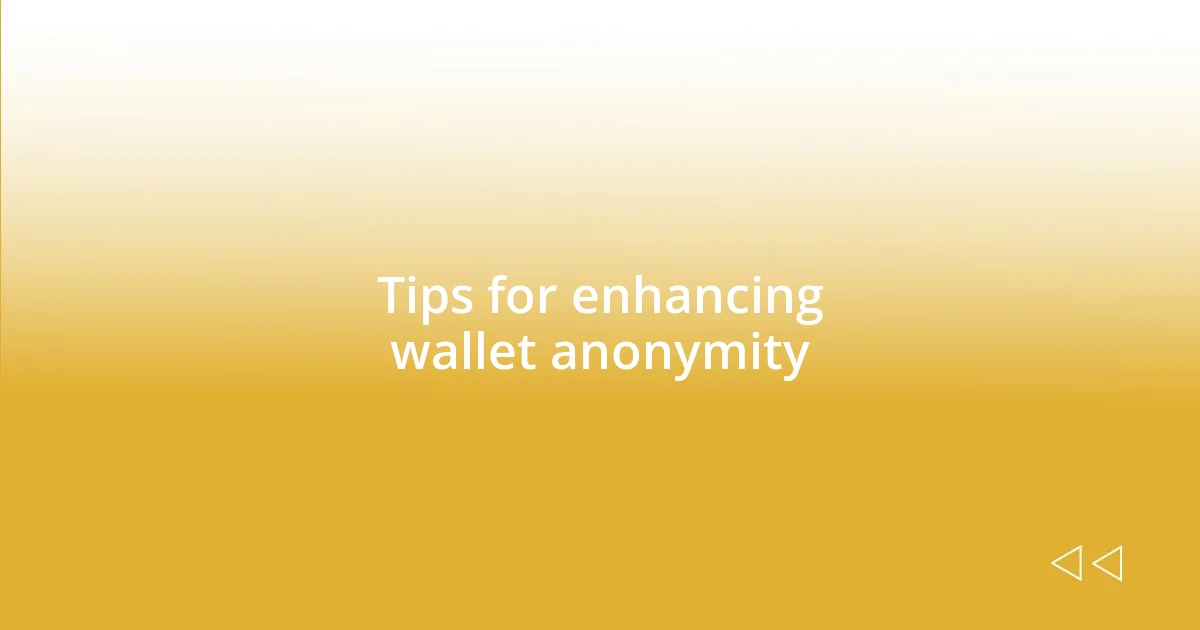
Tips for enhancing wallet anonymity
One effective way to enhance wallet anonymity is to regularly update your wallet software. I remember a time when I neglected this for too long and realized too late that older versions could expose vulnerabilities. It’s just like double-checking your locks at home – small efforts can make a huge difference in your overall security.
Utilizing a VPN (Virtual Private Network) when accessing your wallet adds another layer of privacy. The first time I decided to use one, it felt surreal to browse anonymously, as if I had created a digital invisibility cloak. Have you ever wondered how different your online experience would be when your IP address is hidden? It’s like stepping into a private room at a crowded party, granting you the freedom to engage without being watched.
Lastly, consider creating multiple wallets for different purposes. This might sound tedious, but I find it incredibly liberating. By separating my transactions, I reduce the risk of my entire financial history being compromised. Have you tried splitting your digital assets this way? It not only enhances anonymity but also helps you manage your finances more effectively.
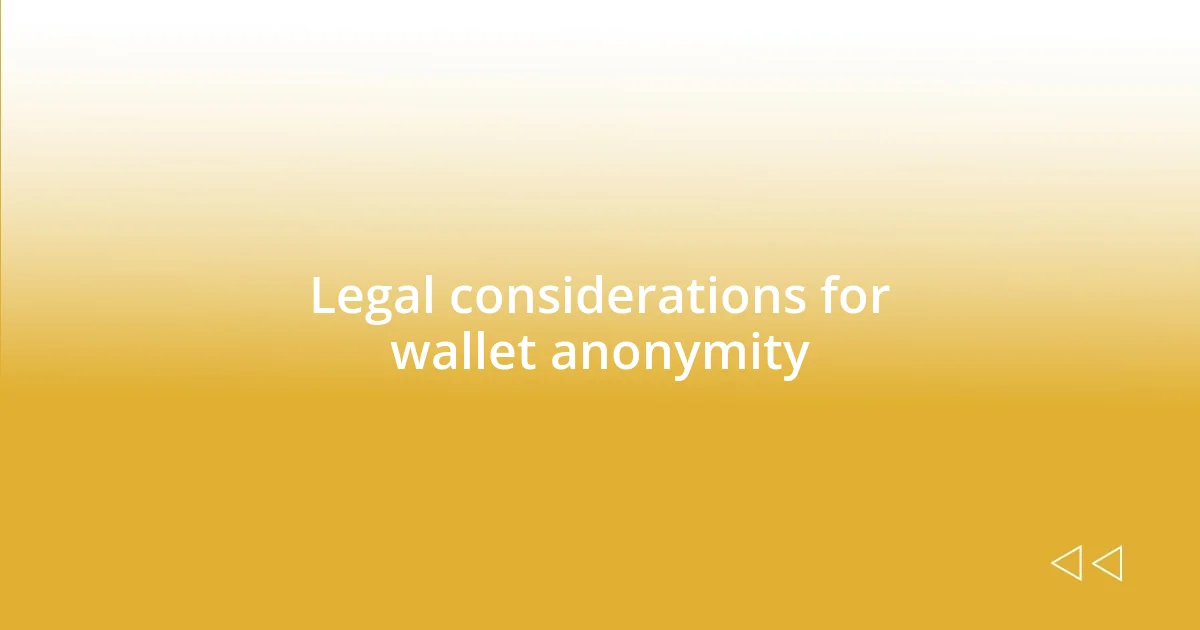
Legal considerations for wallet anonymity
When diving into the legal considerations for wallet anonymity, it’s crucial to recognize that different jurisdictions have varying stances on privacy. I recall a conversation with a friend who lives in a country where anonymous transactions are heavily regulated. They expressed how frustrating it is to navigate the legal framework while trying to maintain financial privacy. Have you ever felt trapped by regulations surrounding your personal choices?
In some regions, using anonymous wallets could lead to legal scrutiny, especially in cases involving anti-money laundering laws. I remember reading about a few unfortunate individuals who faced investigations simply because they favored privacy-enhancing technologies. It struck me that while the idea of anonymity can be empowering, it can also come with significant legal risks that users need to weigh carefully.
Also, there’s an ongoing debate about user privacy versus governmental oversight that’s really fascinating. Each time I see discussions about potential regulations, I find myself pondering the balance between the right to privacy and the need for security. Isn’t it intriguing how the same tool for protecting personal finances can stir up such complex legal dilemmas? Understanding these nuances can help users make informed choices that align with their values and circumstances.










